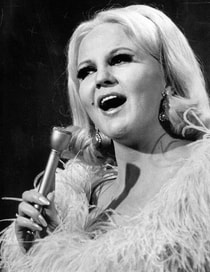
Lesley Gore, born Lesley Sue Goldstein, was 16 and a junior in high school when she recorded her first hit: It’s my Party (and I’ll Cry if I Want to). It was produced by someone who was new to producing by the name of Quincy Jones. Jones would go on to become (among other things) one of the most influential producers and performers of the last century. Lesley would go on to record several more pop girl songs with Quincy as her producer. When she was 17 she brought him You Don’t Own Me.
Musically, this is an interesting song. The verses are all in a minor key. (Remember – a key is just the framework for the song. A minor key usually makes us think of something sad or nostalgic. The Christmas carol What Child Is This is in a minor key.) The chorus of You Don’t Own Me is in a major key. Major keys are often associated with happiness or strength.
This song is such a change from not just Lesley’s other songs but a change from the other songs being sung by women at the time. He’s So Fine, My Boyfriend’s Back, I Will Follow Him (I loved the version of this in Sister Act!) I’m Leavin’ It All Up to You, the list goes on and on. These are songs where the woman is completely subservient to the man. Now, yes, there are a lot of songs about men being hopelessly in love with women, but the men are not treated like objects by the woman.
You Don’t Own Me turns everything on its head. In 1981 I helped a friend escape from her controlling boyfriend. She had to call me in secret while he was out because he had forbidden her from even calling me. One day, she managed to make that call and asked me to come right over. We threw all of her things into a few trash bags and got in my car as quickly as we could. She was terrified that he would come back before we could get her out. This scenario plays out daily all over the country.
According to the National Coalition on Domestic Violence 20 people each minute are abused by an intimate partner. While this is carefully worded to include men and gender fluidity, most of the abused are female.
Many people look on 1963 as the start of the Second Women’s Movement. (The First was the suffrage movement starting shortly after the Civil War and more or less ending in 1920 with the passing of the 19th Amendment to the Constitution giving women the right to vote.) Betty Freidan’s book The Feminine Mystique shook the world, beginning a decades-long fight for equal rights, equal pay, and equal protection under the law. Many think that this second wave of feminism ended in the 1980s, to be taken over by the third wave, which was then taken over by the fourth. Good heavens! It’s Feminism! Let’s not worry about which wave we’re in!
At the beginning of this was a little song, sung by a very young woman. You Don’t Own Me.
You don't own me
I'm not just one of your many toys
You don't own me
Don't say I can't go with other boys
And don't tell me what to do
Don't tell me what to say
And please, when I go out with you
Don't put me on display 'cause
You don't own me
Don't try to change me in any way
You don't own me
Don't tie me down 'cause I'd never stay
I don't tell you what to say
I don't tell you what to do
So just let me be myself
That's all I ask of you
I'm young and I love to be young
I'm free and I love to be free
To live my life the way I want
To say and do whatever I please
And don't tell me what to do
Oh, don't tell me what to say
And please, when I go out with you
Don't put me on display
I don't tell you what to say
Oh, don't tell you what to do
So just let me be myself
That's all I ask of you
I'm young and I love to be young
I'm free and I love to be free
While Lesley had other hits, this was her last one to make it into the Top 10.
I will be playing different version of You Don’t Own Me this week on my Minnich Music FaceBook page this week, so be sure to check those out.
Until next time!



 RSS Feed
RSS Feed